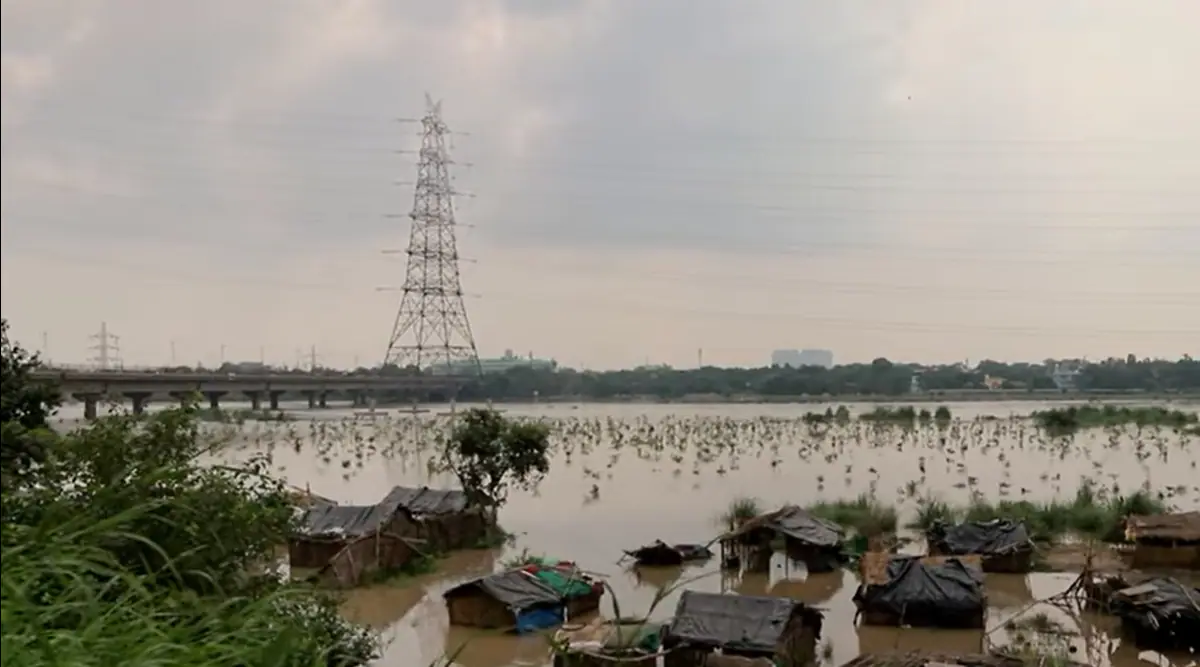[ad_1]
In a barren field wrecked after water levels rose in the Yamuna, Nundevi and her husband, Suresh, were drying the soggy belongings they had left behind when they shifted to tents on higher ground. “These are our fields, but on lease. We will not be able to cultivate for a while now,” Nundevi spoke over the din of a metro train passing nearby.
The tents were erected in Mayur Vihar Phase I on August 13, when the water level rose beyond the “danger mark” of 205.33 m. The water level rose dramatically in the evening, pushing for immediate evacuation attempts.
“The authorities put up some tents without taking into account the number of inhabitants in the area and disappeared,” she said, adding, “We make our own food. Some days they give us food; other days they don’t.”
A civil defence volunteer at the spot said there were 45 tents on that day, of which some were taken down when many families left after the water receded. “We have received no orders to dismantle the camps. They will remain for a while,” he said.
A chain of high-roofed white tents lining the roadside near the Phase I metro station, the camps have no division. Food, mattresses, livestock and families sit huddled under the same roof, with neither a wall nor a screen to demarcate one space from the other.
A few metres away from the rehabilitation camp stood a tent where around 26 kids sprawled over puzzles and shape blocks. The small school camp was set up by Save the Children, an NGO working for the rights of children. The camp meant to bridge the learning gap at a time when children are unable to attend school clubbed different aged kids for the same activities. A 12-year-old was seen struggling to solve a jigsaw puzzle. A Smile-on-Wheels van also stood by, providing medical assistance to evacuees.
No such tent set up by the government was seen at the spot.
Farmer couple Nanni and Ramji Lal, who have been there for five days, said, “We got food on two days. We do not have toilets. So we go under the flyover to relieve ourselves. Earlier, we used to get better facilities. Children used to get bread and milk, and a van would announce warnings five days prior to a rise in water levels.”
Meanwhile, Anil Banka, district magistrate (east), said that although the evacuees were provided with an option to move to a school nearby, none of them agreed to it. “They said they wanted to remain close to their homes and we had to set up tents. If they had chosen to move to schools, they would have had electricity, toilet facilities and water.”
On the provision for food at the camps, he said that meals were provided thrice a day, and toilets were also provided. “On August 12, we received a forecast that the water levels were nearing the danger mark. We started the evacuation before the water reached the 205.99-m mark,” he added.
The white tents over Ramji and Nanni’s heads did little to protect them from rain and the afternoon sun. “When it rains, we get drenched as the ceiling is at a great height. The tents cannot brave the winds and rain here,” Nanni said.
“Yesterday, they came to dismantle the tents despite the water level not receding in many places. The locals had to persuade the officials to let them continue their stay. Where are we supposed to go?” Ramji said.
It was the fourth day their 10-year-old daughter Madhu missed school. “My books and bag were washed away. I have not gone to school ever since. I do not like it here because there are many stray dogs and cows,” she said. “I want to become a doctor so that I can treat people here when they fall sick from diseases like dengue,” she added.
In the sweltering heat, a man sleeping in the neighbouring tent had a small fan connected to a solar panel. Ramji was also seen loading a solar panel and a battery onto his cart. “We get electricity supply neither in the camp nor in our house. So I had to buy this to keep the lights on.” he said.
This was true of many other locals, as similar solar panels could be seen with the belongings of other evacuees. “It cost me around Rs 5,000 to buy a panel but I need it for my daily use,” said a local who was carrying a panel on his head.
[ad_2]
Source link

